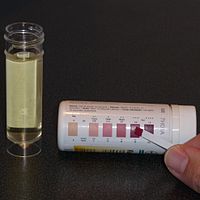
Photo from wikipedia
Purpose Coagulopathy is common in patients with COVID-19. The ideal approach to anticoagulation remains under debate. There is a significant variability in existing protocols for anticoagulation, and these are mostly… Click to show full abstract
Purpose Coagulopathy is common in patients with COVID-19. The ideal approach to anticoagulation remains under debate. There is a significant variability in existing protocols for anticoagulation, and these are mostly based on sporadic reports, small studies, and expert opinion. Materials and methods This multicenter retrospective cohort study evaluated the association between anticoagulation dose and inpatient mortality among critically ill COVID-19 patients admitted to the intensive care units (ICUs) or step-down units (SDUs) of eight Beaumont Healthcare hospitals in Michigan, USA from March 10th to April 15th, 2020. Results Included were 578 patients with a median age of 64 years; among whom, 57.8% were males. Most patients (n = 447, 77.3%) received high dose and one in four (n = 131, 22.7%) received low dose anticoagulation. Overall mortality rate was 41.9% (n = 242). After adjusting for potential confounders (age, sex, race, BMI, ferritin level at hospital admission, intubation, comorbidities, mSOFA, and Padua score), administration of high anticoagulation doses at the time of ICU/SDU admission was associated with decreased inpatient mortality (OR 0.564, 95% CI 0.333–0.953, p = 0.032) compared to low dose. Conclusion Treatment with high dose anticoagulation at the time of ICU/SDU admission was associated with decreased adjusted mortality among critically ill adult patients with COVID-19.
Journal Title: PLoS ONE
Year Published: 2022
Link to full text (if available)
Share on Social Media: Sign Up to like & get
recommendations!